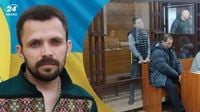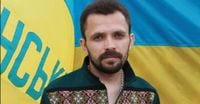In a controversial turn of events, two young men convicted of the brutal murder of activist Artem Miroshnichenko in 2019 have been released from prison to serve in the Armed Forces of Ukraine (AFU) under contract. This decision has sparked outrage among the victim's family and the public, raising questions about justice and accountability in the country.
On November 29, 2019, Miroshnichenko, a 36-year-old activist and volunteer from Bakhmut, was attacked and severely beaten on Gorky Street, not far from a post office. He succumbed to his injuries after spending over a week in a coma at the hospital. The perpetrators, identified as 16-year-old Nikolai Barabash and 17-year-old Alexander Baryshko, were sentenced to 8 and 9 years and 2 months in prison, respectively, by the Slavyansk District Court in June 2024.
Following their sentencing, both Barabash and Baryshko expressed a desire to join the military and submitted applications to the correctional colonies where they were incarcerated. In February 2025, the Poltava and Pervomaisky district courts granted their requests for parole, allowing them to join the AFU. This decision has been met with significant backlash, particularly from Miroshnichenko's family.
Sergey Miroshnichenko, the brother of the deceased activist, took to Facebook to voice his anger and concerns regarding the release of his brother's killers. "The two criminals who killed my brother are already free. After serving a sentence of 8 years and 9.2 months, they decided to sign a contract and join the AFU. I do not believe in their remorse or sincere desire to protect Ukraine; this is merely a legal way to escape prison and run away," he wrote.
Moreover, Sergey expressed fears that Baryshko, who had reportedly deserted his military unit shortly after joining, might flee to Russia, where his mother resides. "This is a legal way to avoid punishment and escape. One of them has already done it! He is currently in a safe zone, and his mother is in St. Petersburg, so this scoundrel could easily slip away," he lamented.
The case has drawn attention not only for its tragic nature but also for the implications it holds for the justice system in Ukraine. The circumstances surrounding Miroshnichenko's murder suggested that the attack may have been motivated by his use of the Ukrainian language, which has been a point of contention in the country. Miroshnichenko was known for his support of Ukrainian military efforts and volunteer initiatives since the onset of the conflict in eastern Ukraine.
Witnesses reported that the attack was unprovoked, with the assailants targeting Miroshnichenko simply because he spoke Ukrainian. After the brutal beating, one of the attackers attempted to drag Miroshnichenko into a nearby alley and struck his head against the pavement when he failed to do so. The medical team later diagnosed him with a skull fracture, and despite several operations, he passed away on December 6, 2019.
As the news of the convicts' release spread, many have questioned the integrity of the judicial process, particularly the decision to allow individuals convicted of such heinous crimes to serve in a military capacity. Critics argue that it undermines the rule of law and sends a troubling message about accountability.
In response to the developments, Alexander Kadievsky, the lawyer representing Miroshnichenko's family, stated that an appeal against the court's decision regarding the convicts' early release could have been filed within seven days, but several months have now passed since the ruling was made. He emphasized the need for transparency in the judicial process and for the prosecution to have promptly informed the family about the decision.
The case has also highlighted broader issues within the Ukrainian justice system, particularly concerning how cases of violence and hate crimes are handled. Many activists and human rights organizations are calling for reforms to ensure that victims' families are kept informed and that justice is served fairly and consistently.
As the situation unfolds, the family of Artem Miroshnichenko continues to seek justice for their loved one, grappling with the reality that the individuals responsible for his death are now potentially in positions of power and authority within the military. The implications of this case extend beyond Miroshnichenko's family, touching on national concerns about justice, accountability, and the treatment of hate crimes in Ukraine.
In light of these events, many are left wondering how the justice system can reclaim its integrity and ensure that such tragedies do not repeat themselves in the future. The case of Artem Miroshnichenko stands as a stark reminder of the challenges that lie ahead for Ukraine as it navigates the complexities of a nation still healing from the wounds of conflict and striving for a just society.





